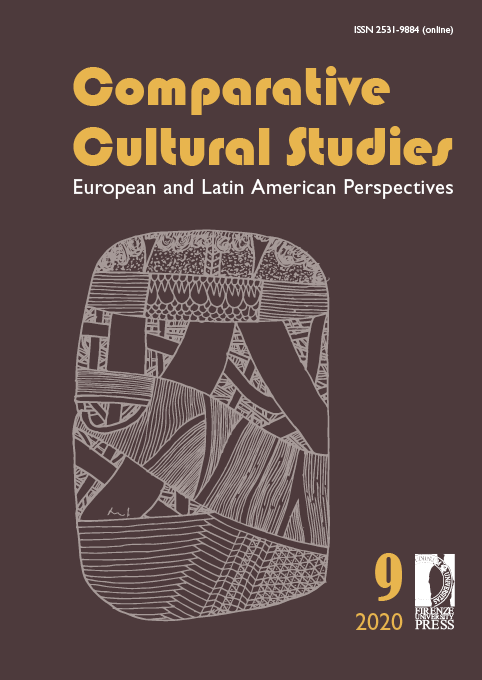El danzón en los estudiantes de Licenciatura en Comunicación Social de la Universidad de Matanzas. Su conocimiento y representación social
DOI:
https://doi.org/10.13128/ccselap-11849Keywords:
danzón, knowledge, social representation, social communication, studentAbstract
A priority objective of the Multicultural Studies “Fernando Ortiz” Department (CEMFO) is to raise the epistemic level of students of Social and Humanistic Sciences, respect to the intangible cultural heritage of the Cuban nation and its development in the province of Matanzas. The article informs the results of a research guided by qualitative and critic paradigms, focused on the knowledge and social representation of a sample of foreign languages students about danzón, created by musician Miguel Ramón Demetrio Faílde y Pérez (1852-1921) who premiered it in Matanzas, his hometown, on January 1, 1879; that as a rhythm it assimilated musical elements of cosmopolitan origin and, in turn, became basic with respect to others such as the danzonete (1929), the mambo (1938), popularized worldwide ten years later by another musician of Matanzas, Dámaso Pérez Prado (1916-1989); and the cha-cha-chá (1951). Based on the results of the research, the key epistemic concepts of a system of teaching activities were designed to develop, in the student worldview, knowledge and a positive social representation of the heritage value of the danzón. The authors are currently researching Social Communication students, with similar purposes to help their best future professional performance.
Downloads
References
Carpentier Alejo, La Música en Cuba [1946], Editorial Letras Cubanas, La Habana, 2004.
Crespo R., Ortega J. D., Mercadet N. N., El valor patrimonial de religiones con elementos del componente africano del etnos cubano. Una propuesta necesaria de salvaguarda sociocultural comunitaria, Letras Uruguay, Montevideo, 2017; recuperado de: <http://letras-uruguay.espaciolatino.com/aaa/crespo_garcia_rolando/index.htm/>.
Geertz Clifford, Thick Description: Toward an Interpretive Theory of Culture, en The Interpretation of Cultures: Selected Essays, Basic Books, New York, 1973.
Giro Radamés, Diccionario enciclopédico de la música en Cuba, Editorial Félix Varela, La Habana, 2007.
Gómez García Z. E., Dos textos en el tiempo: La música en Cuba y Música popular brasile-ña, en «Clave», no. 3, 2002, pp. 43-47.
Jodelet Denise, La representación social: fenómenos, concepto y teoría, en Moscovici, S. (comp.). Psicología social II. Pensamiento y vida social. Psicología social y problemas sociales, Paidós, Barcelona, 1986.
Mejuto M., Guanche J. (comps.), La cultura popular tradicional. Conceptos y términos básicos, Consejo Nacional de Casas de Cultura, La Habana, 2008.
Orovio, Helio, Diccionario de la Música Cubana, Editorial Letras Cubanas, La Habana, 1981.
Ortega Suárez J. D., González García R., El Espiritismo Moderno en Cuba (II). Su establecimiento en el país: una polémica todavía abierta, Cátedra de Estudios Multiculturales “Fernando Ortiz” (CEMFO), La Habana, 2014.
Ortiz Fernando, Contrapunteo cubano del tabaco y el azúcar [1940], Editorial Ciencias Sociales, La Habana, 1983.
UNESCO, Convención para la Salvaguarda del Patrimonio Cultural Inmaterial. Artículo 2,3: Definiciones, UNESCO Press, Paris, 2003.
UNESCO, UNESCO Issues First Ever Proclamation of Masterpieces of the Oral and Intangi-ble Heritage, UNESCO Press, Paris, 18 de mayo de 2001.
Laureiro Ramírez Iris, Fernando Ortiz: Lo africano en la identidad cultural cubana, en Memorias del XVII Taller de Antropología Social y Cultural Afroamericana y VI Encuentro Festival Afropalabra, Casa de África, La Habana, 2013.
Lund Joshua, Barbarian Theorizing and the Limits of Latin American Exceptionalism, en «Cultural Critique», no. 47, invierno de 2001, pp. 54-90.
Manuel, Peter, Creolizing Contradance in the Caribbean, Temple University Press, Philadelphia, 2009.
Naranjo Orovio Consuelo, La historia se forja en el campo: nación y cultura cubana en el siglo XX, en «Historia Social», no. 40, 2001, pp. 153-174.
Clayton P., Gammond P., Guía alfabética de los nombres, los lugares y la gente del jazz, Edi-torial Taurus, Madrid, 1990.
Downloads
Published
How to Cite
Issue
Section
License
Copyright (c) 2020 Nancy Narcisa Mercadet Portillo, Jorge Domingo Ortega Suárez

This work is licensed under a Creative Commons Attribution 4.0 International License.
This licence allows third parties to share (copy and redistribute the material in any medium or format) and adapt (remix, transform and create from the material for any purpose, including commercial purposes), provided that authorship and first publication in this journal (The Journal, DOI of the work) is acknowledged, a link to the licence is provided, and it is stated whether changes have been made to the work.







